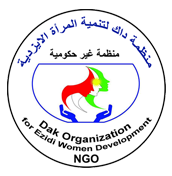Building bravery for a brighter future
“Before I was a dead woman, imprisoned at home in two rooms…After meeting with this organization, I changed.”
When her husband left to work overseas, Roj and her three children were left to live with her abusive in-laws, who controlled her life: from mobility and social contacts to accessing money. “In the beginning, I was very scared of them, they [in-laws] were beating me and beating the children,” recalled Roj. Though she dreamt of escaping, the fact that her children did not have identification was a major obstacle. Without identification, the children could not be enrolled in school. “My son lost one year of school. He cried and pleaded with me to tell his father to make his ID.”
Just when Gulistan was about to close her case, Roj surprised her by calling and telling her that she wanted to report her in-laws to the police for abuse. “I looked at Gulistan and I trusted her. She was very strong. She was speaking to me and I was getting braver.”
Roj and Gulistan visited the Directorate for Combatting Violence Against Women (DCVAW) office and reported the abuse. Roj bravely gave a statement about all of the abuse she faced in the presence of her husband’s relatives. “They became defensive and said that they would not take care of me or leave me alone, and that this was about their honor,” said Roj.
After discussing with Roj and Gulistan, the officer recommended they order her in-laws to sign a pledge to stop abusing her, which they did. The officer warned them that if they abused her again they would risk up to six months in jail.
As Gulistan explained, “[W]hen dealing with my clients, I always explain to them that I will be with them no matter what their decisions are, I will always support them, and I will support and respect their decisions. My role is to raise their awareness legally and to provide them with information and options. Our people have very limited legal information, they don’t know their rights, they don’t know that there are laws that can protect them. It’s my role to explain their rights for them.”
Roj has now enrolled her three children in school and the situation in her in-laws’ home has improved. “[T]hey write their homework and go out to the yard and in the street. My children ask me, “Is this a dream, are we are out of their house?’” With the law on her side, her in-laws have loosened up their restrictions and have started to treat Roj and her children with respect.
The USAID-funded GRPR L&P program trained the Dak Organization lawyers to take a client- and survivor centered approach to legal representation, ensuring that women fully understood their legal rights, the risks and benefits of various options, and that they were actively engaged in making decisions about their cases.
Source of the Story: https://www.usaid.gov/iraq/program-updates/mar-2021-building-bravery-brighter-future




